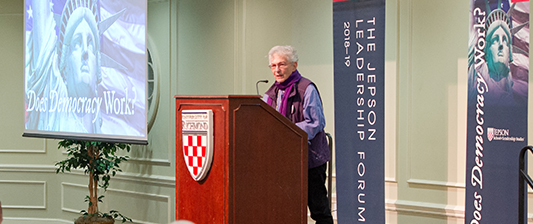
“Be bold.” In her telling, noted leadership scholar James MacGregor Burns offered this advice as Blanche Wiesen Cook began work on her three-volume biography of Eleanor Roosevelt. Dr. Cook, distinguished professor of history and women’s studies at John Jay College of Criminal Justice and the Graduate Center of CUNY, spoke at the Jepson School as part of the 2018-19 Forum series, Does Democracy Work? Cook’s work highlights the significant, myriad, and underappreciated leadership roles of Eleanor Roosevelt.
In her talk, Dr. Cook emphasized Roosevelt’s boldness and her own. Cook wove stories of Eleanor’s prescient contributions to leadership and governance—well ahead of her time and in some instances beyond what we have achieved, even now—with stories about her own struggles to achieve inclusive democracy. Erudite as she is, 50 some years ago she failed the required literacy test for voting due to the unyielding bias of the registrar!
What might leadership look like if it prioritized Roosevelt’s “great love,” which was, as Cook informs us, “the people?” Bold, certainly. Roosevelt championed those who were excluded from participation in the democracy. Excluded by the poll tax, prejudice, poverty, or wrongful internment. As early as 1934, she opposed segregation. As the war drew to a close, she understood the importance of globalization.
All of this came at a cost, as visionary leadership frequently does. For Roosevelt, it meant the CIA under J. Edgar Hoover developed a file containing notes of her activities and speeches. Dr. Cook remarked with some satisfaction on the size of the file—4,000 pages!
Cook draws important leadership lessons from her study of this remarkable woman. Political democracy, Cook insists, requires economic democracy, the participation by all in economic as well as political activity. Like Eleanor Roosevelt, Dr. Cook believes this requires full participation. “We must build movements,” she insists, and “we must talk.”
This latter remark raised a query during the question-and-answer period about the difficulty of talking across political or ideological divides. Dr. Cook immediately understood the context of this question, as this is a subject of debate on many college campuses. She remarked about her strong disagreements with Arthur Schlesinger over President Roosevelt’s apparent unwillingness to act in the face of the extermination of Jews in Europe. A face-to-face conversation led to relative understanding on the part of both. From this, Dr. Cook continued boldly to insist that we must begin and continue to talk across divides.
Dr. Cook’s own leadership qualities are clear. They come both from life experience as well as deep knowledge of a remarkable and bold leader.
